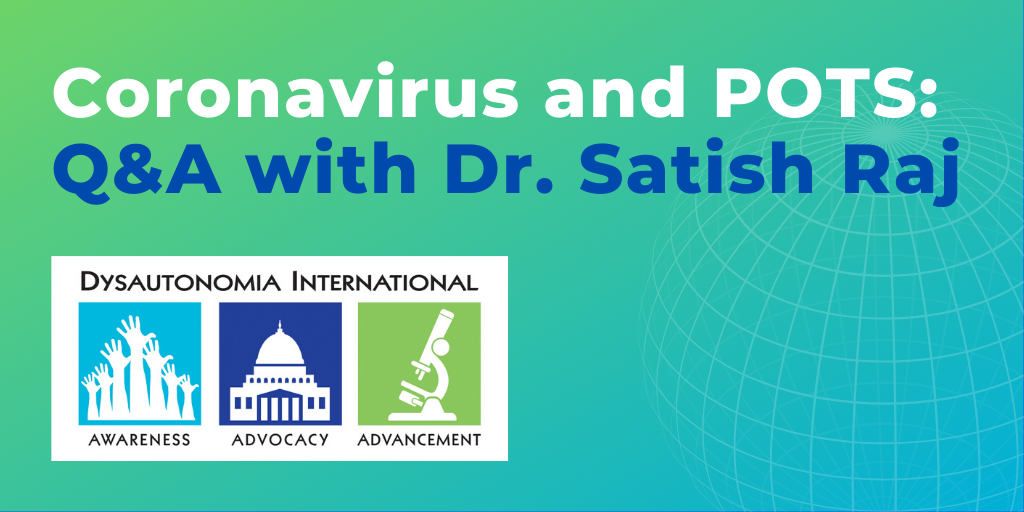 Dysautonomia International Medical Advisory Board member Dr. Satish Raj answered some common coronavirus questions we’re seeing on our support groups. Dr. Raj is a Professor of Cardiac Sciences at the University of Calgary.
Dysautonomia International Medical Advisory Board member Dr. Satish Raj answered some common coronavirus questions we’re seeing on our support groups. Dr. Raj is a Professor of Cardiac Sciences at the University of Calgary.
I can’t reach my doctor and I think I may have coronavirus. What should I do?
Keep trying to reach your doctor, but in the meanwhile, you can use the CDC’s self-checker tool to see if your symptoms may be due to coronavirus. Make sure that you are “self-quarantining” if you have symptoms EVEN if you have not yet tested positive.
I have symptoms suggestive of coronavirus, but I can’t get tested. What should I do?
If you haven’t already done so, call your doctor to let them know you are feeling ill. Follow the advice from your doctor. If you cannot reach your doctor follow the CDC’s self-care guidelines. Most cases of COVID-19 can and should be managed at home, even in people with dysautonomia.
Since there are limited tests available at this time, government agencies and hospitals are limiting tests to those who need it most, like healthcare workers. Even if you test positive, the treatment is supportive. This means “riding through it” if able to do so at home, or being admitted to hospital if you need breathing support (hopefully not).
Is it normal to feel your heart racing faster than usual when someone with POTS has an infection?
Yes, it’s common for people with POTS to have a temporary worsening of their POTS symptoms, including more heart racing, when they have any infection. Even healthy people can develop some heart racing when they have an infection.
Should I go to the ER during the coronavirus pandemic if I am having a POTS flare?
It’s really important to avoid visiting the hospital at this time unless you are experiencing a life threatening situation. Hospitals are starting to become overwhelmed with COVID-19 patients who need emergency medical care to help them breathe. Visiting the hospital may expose you and anyone who joins you to COVID-19.
POTS flares can be very uncomfortable or distressing, but POTS is not life threatening. It is best to manage a POTS flare at home. Most POTS patients can ‘ride out’ a flare at home by resting in a quite space, laying down, putting their feet up on the wall or a few pillows, making sure they’re properly hydrated (some extra salt and fluids usually helps), and making sure they’ve taken their medications as prescribed. Eating frequent small low carb snacks or small meals several times a day can be helpful during a flare, rather than three larger meals. Slowing down your breathing or using relaxation apps may also help (POTS is not caused by stress, but being stressed about a flare can make the flare worse).
If you feel that you must go to the hospital, try to call first so that you can be instructed on what to do when you arrive, as many hospitals are trying to separate respiratory infection patients from other patients.
Stay up to date on the latest dysautonomia news, research and events by joining Dysautonomia International’s email list.